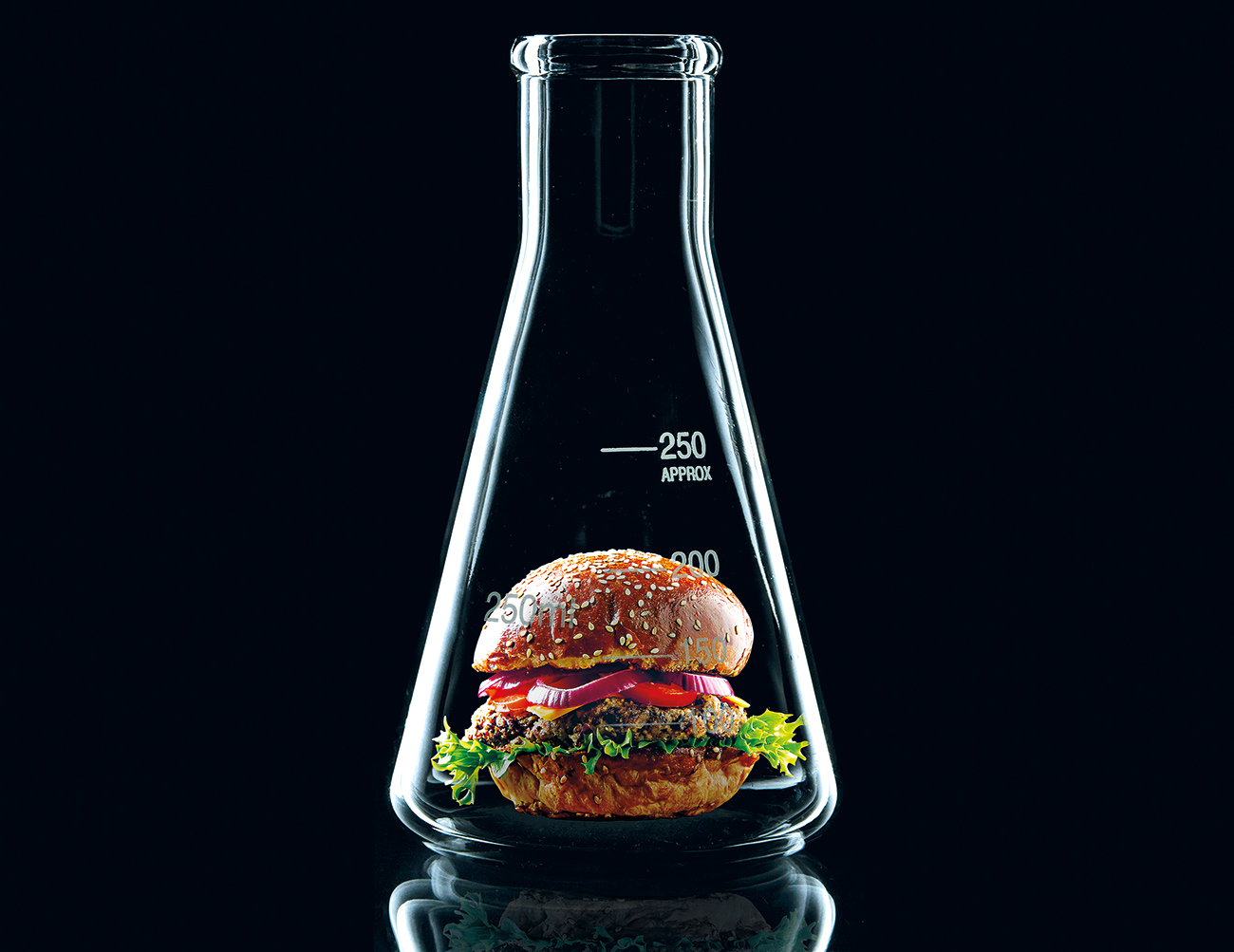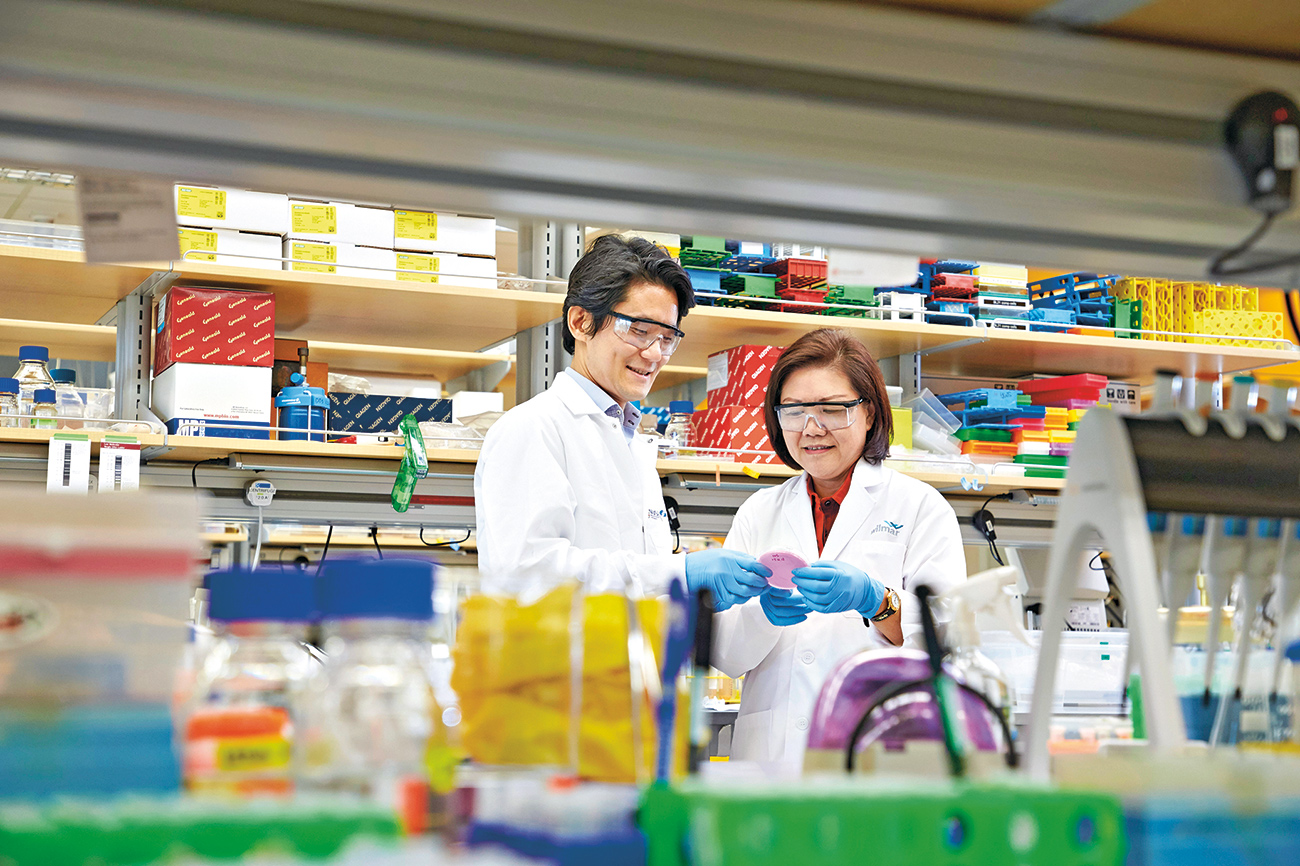Food of the Future
These scientists are cooking up a storm in the lab — all in a bid to have you eat healthier and change your mind about how healthy food tastes.
 Did you know? Getting a newly-developed food product onto supermarket shelves can take anywhere between 6 months and 5 years, depending on factors like regulatory approval as well as the ease of production and research.
Did you know? Getting a newly-developed food product onto supermarket shelves can take anywhere between 6 months and 5 years, depending on factors like regulatory approval as well as the ease of production and research.
AN APPETITE FOR ADVANCEMENT
Officially launched on 19 June 2018, the WIL@NUS Corporate Laboratory seeks to strengthen Singapore’s innovation ecosystem by conducting research aimed at creating healthier food products, as well as
designing cost-effective and sustainable methods of producing chemical compounds using natural sources.
As Singapore’s health authorities grapple with the challenge of fighting diseases like diabetes and obesity, its research and development (R&D) sector is also answering the call by spearheading advances in food technology. Take the recently-launched WIL@NUS Corporate Laboratory for instance. Jointly set up by Wilmar International, NUS and the National Research Foundation (NRF), this $110 million-facility will develop healthier foods through innovation in food technology and sustainable biochemicals.
Noting the lab’s importance to Singapore’s public health sector, NRF Chairman and Finance Minister Heng Swee Keat said, “WIL@NUS will hopefully advance the health and wellbeing of Singaporeans and people around the world, and allow us to better understand how we can prevent and manage diabetes in Singapore in the long run, which will help us to win our ‘war’ against diabetes.”
The facility’s director, Associate Professor Matthew Chang, shares that since its inception, the facility has embarked on five clinical studies. Together, these examine how food technology can be used to reverse and maintain Type 2 diabetes and improve weight management as well as study the impact of food on overall gut health. Working with partner institutions at A*STAR, the lab will also look into the food ingredients or food combinations that will promote health and wellbeing, specific to the genetic profiles of Singaporeans.
BRINGING HEALTHY BACK
But population health is just one major focus area for WIL@NUS. “We also want to develop healthier foods,” explains Assoc Prof Chang, 43, adding that the facility’s 50 or so researchers will also look into harnessing technology to make everyday products like cooking oils healthier. While healthier oils — defined loosely by their high polyunsaturated fat content — are not unheard of, they are often more expensive than their unhealthier counterparts. Certain varieties, like olive oil, are also unsuitable for Asian cooking, given their low smoking point.
As they develop products to complement these existing ones, researchers will work closely with Dr Rebecca Lian, a Distinguished Fellow at Wilmar and one of Singapore’s top food technologists. Over the course of her nearly 40-year career, Dr Lian, 63, has overseen the production of foods like soya sauce and instant noodles for big brands like Nestlé. “When we say we’re going to develop healthier cooking oils, what we really mean is that we want to engineer an oil and change its structural formula, to perhaps include more beneficial compounds or remove some harmful ones.”
She adds that modifying the components of food is not entirely new. “In the past, food companies modified food with one thing in mind: taste. But today, they have to consider health as well, simply because consumers demand it,” she explains. But researchers cannot forego taste, since consumers — especially food-loving Singaporeans — still value this.
 Assoc Prof Chang and Dr Lian, at the WIL@NUS Corporate Laboratory
Assoc Prof Chang and Dr Lian, at the WIL@NUS Corporate Laboratory
SHARING THE FRUITS
Another way that WIL@NUS adds to the value chain is by providing an avenue for research results to quickly translate to real-world products, thanks to its in-depth knowledge of consumer needs and patterns. “Researchers sometimes work in silos. This means that they create a wonderful product that isn’t exactly what the market or consumers need or want,” Dr Lian shares. “Any research we do must result in implementation — the real world needs an economic output from the investment (into research).”
This is why both Dr Lian and Assoc Prof Chang are so excited about WIL@NUS. “As one of the largest producers of oleochemicals and consumer pack edible oils on the planet, Wilmar understands what is needed in the real world,” says Assoc Prof Chang. “And then we at WIL@NUS sit down together, brainstorm and come up with new technological solutions to these real-world issues.” Adds Dr Lian, “You also need the science and the strong technical knowledge, which Assoc Prof Chang and his team have readily available.”
WIL@NUS will also strengthen industry partnerships with small and medium enterprises (SMEs) to equip them with greater knowledge as well as opportunities for growth. As Dr Lian explains, “Some of the products we create, Wilmar may not actually manufacture. So we can pass these on to have SMEs produce this.” Such partnerships will further enliven Singapore’s fast-growing R&D sector. In 2016, Prime Minister Lee Hsien Loong announced a Government investment of $19 billion into research over five years until 2020. And as WIL@NUS shows, the private sector as well as academic institutions like NUS are also committing similar resources. What do such tripartite funding and partnerships mean for researchers like Assoc Prof Chang and Dr Lian? “There has never been a better time to be in food tech,” says Dr Lian. And given her vast experience in the sector, we’re inclined to believe her.